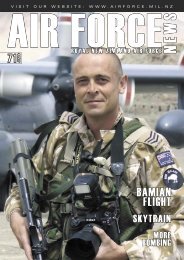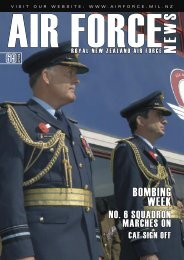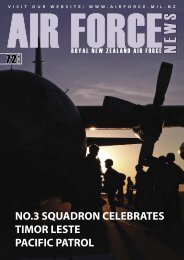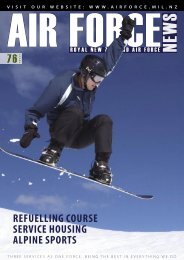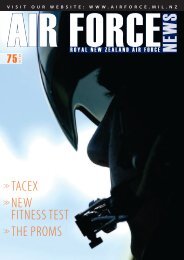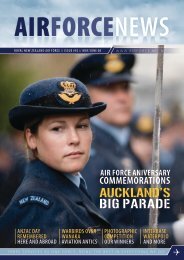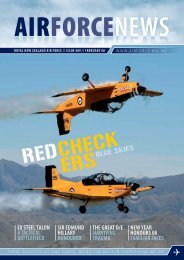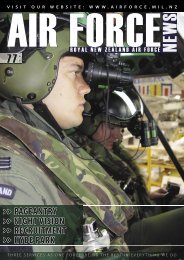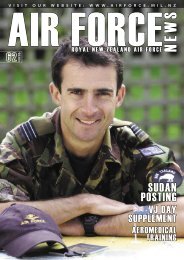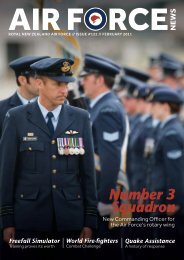February 2007, Issue 78 [pdf 3mb, 44 pages] - Royal New Zealand ...
February 2007, Issue 78 [pdf 3mb, 44 pages] - Royal New Zealand ...
February 2007, Issue 78 [pdf 3mb, 44 pages] - Royal New Zealand ...
Create successful ePaper yourself
Turn your PDF publications into a flip-book with our unique Google optimized e-Paper software.
32<br />
B O O K R E V I E W<br />
LAST LINE OF DEFENCE<br />
NEW ZEALANDERS<br />
REMEMBER THE<br />
WAR AT HOME<br />
EDITED BY MEGAN HUTCHING<br />
PUBLISHED BY HARPER COLLINS<br />
REVIEWED BY CHARLES COOKE<br />
AVAILABLE MARCH <strong>2007</strong><br />
This is the seventh and final book in the series of oral histories of veterans of<br />
the 1939 – 1945 war. A history of the men and women who served in <strong>New</strong><br />
<strong>Zealand</strong>, and were indeed the last line of defence.<br />
<strong>New</strong> <strong>Zealand</strong> was not well prepared<br />
for war, with only small permanent and<br />
territorial forces. The attack on Pearl<br />
Harbour, and the subsequent capture of<br />
Singapore, made the threat of invasion<br />
a reality. By October 1942, 107,000<br />
people were serving in NZ based defence<br />
forces with more than 250,000 serving<br />
in the Home Guard and a variety of<br />
Emergency Services.<br />
In the interviews the author successfully<br />
captured the mood of those years and<br />
how the war affected their lives. There was<br />
still a close emotional bond with Britain,<br />
and a patriotic urge to serve ‘King and<br />
Country’.<br />
This book has a high degree of human<br />
interest portraying the lives and events of<br />
people quickly put in uniform, trained, with<br />
some sent overseas, and what happened<br />
to them after the war. Many friendships<br />
were formed which lasted, while many<br />
marriages failed due to separation and<br />
uncertainty.<br />
In reflecting on their war time service,<br />
many agreed that they had grown<br />
emotionally during those war years; most<br />
of the women had never been away from<br />
home and the experience made them<br />
more independent.<br />
Post war adjustments to civilian life were<br />
not always easy, the trauma of war created<br />
problems for some. On a light hearted<br />
note; one soldier living in a small flat<br />
in Wellington after the war with his wife<br />
and two small sons found the quiet of<br />
home life difficult. He had spent so long<br />
in crowded male barracks that home life<br />
was too quiet.<br />
And for the sublime, the best example<br />
noted, the Home Guardsman who<br />
following his discharge received an invoice<br />
for 1/7d (15 cents) because he failed to<br />
return a field dressing.<br />
Conditions of war frequently develop<br />
enduring bonds of friendship between<br />
servicemen. One interesting story is of 60<br />
airmen arriving late one night in Picton to<br />
learn that their travel to Delta camp, near<br />
Blenheim, was to be completed standing<br />
crushed together in the guards van. They<br />
were tired and hungry, having travelled<br />
from Auckland, one rummaged in his<br />
great coat and located a bar of chocolate<br />
which he shared half of with the airmen<br />
next to him. Sixty five years later they still<br />
remain friends.<br />
Also included are the recollections of<br />
those who registered as conscientious<br />
objectors, held for the duration of the war<br />
in detention camps. The camp conditions<br />
were harsh; the sincerity of those dissenters<br />
is sensitively expressed.<br />
This is an interesting record of our history,<br />
complemented by a good selection of well<br />
chosen photographs.<br />
A highly recommended book, a fitting<br />
conclusion to the Year of the Veteran.<br />
AFN<strong>78</strong> FEBRUARY 07<br />
www.airforce.mil.nz<br />
ON PROFESSIONALISM<br />
WGCDR Tim Walshe<br />
As we begin a new year it is timely to<br />
reconsider our mission as an Air Force<br />
‘To carry out military air operations<br />
to advance <strong>New</strong> <strong>Zealand</strong>’s security<br />
interests, with professionalism, integrity<br />
and teamwork’. As with past years, this<br />
mission is sure to provide us all with many<br />
challenges. While I am sure we have all<br />
read this mission statement many times,<br />
how often have you stopped to consider<br />
it more closely? For example, what are<br />
“military air operations”?<br />
It is military air operations,<br />
or put another way, the<br />
provision of air power, that<br />
sets us apart from other<br />
similar organisations.<br />
Recognition of this fact<br />
and a wider appreciation<br />
of the role of air power in<br />
<strong>New</strong> <strong>Zealand</strong>’s security is the fundamental<br />
aim of the Air Power Development<br />
Centre’s (APDC) work.<br />
However, the mission statement also<br />
acknowledges three of the Service’s core<br />
values of professionalism, integrity and<br />
teamwork. Again, we have no doubt read<br />
these on many occasions but have we<br />
taken the time to consider their meaning<br />
and contemplate how they should guide<br />
our actions? In the following issues of<br />
the Air Force <strong>New</strong>s the APDC team will<br />
each take a look at one of these values<br />
and explore its meaning and how it<br />
might guide our<br />
actions.<br />
L e t<br />
AFN<strong>78</strong> FEBRUARY 07 www.airforce.mil.nz<br />
me begin with Professionalism.<br />
During last years tri-nations, my family<br />
and I had the great pleasure of attending<br />
the Captain’s run the day before the<br />
All Blacks test match with South Africa<br />
in Wellington. For my two boys it<br />
was an occasion that they will always<br />
remember and interestingly, has had<br />
direct consequences on their Weetbix<br />
consumption. While the occasion<br />
provided an opportunity to see the team<br />
up close, the aspect that impressed<br />
One well known perspective of<br />
professionalism suggests that the<br />
professional person is an expert with<br />
specialised knowledge and skills in a<br />
significant field of human endeavour.<br />
me most was the way in which the All<br />
Blacks interacted with the public, a<br />
public that must at times challenge their<br />
patience. After all, how many autographs<br />
and smiling photographs constitutes<br />
enough?<br />
This experience came to mind when<br />
considering the notion of professionalism.<br />
Professional rugby is now a well<br />
established reality, but, was it the simple<br />
fact that rugby players got paid for<br />
doing ‘the job’ that meant they were<br />
professional? In the basic sense of the<br />
word you might argue this, in particular<br />
when using the word as an adjective<br />
and seeking a distinction from the days<br />
of amateur rugby. However, as we all<br />
know, true professionalism is more<br />
than money and when considering<br />
profession as a noun, implying<br />
the occupational group, the<br />
word offers new perspectives.<br />
One well known perspective<br />
of professionalism suggests<br />
that the professional person<br />
is an expert with specialised knowledge<br />
and skills in a significant field of human<br />
endeavour. Also, expertises are acquired<br />
only by prolonged education and include<br />
a breadth of knowledge which is lacking<br />
in the normal trade. It is argued that<br />
professions are steeped in history and<br />
some knowledge of that history is essential<br />
to professional competence. Finally, the<br />
professional can only successfully apply<br />
his or her skill when they are aware of<br />
the broader traditions of which he is a<br />
part including ethical<br />
constraints and written<br />
and unwritten rules<br />
which guide behaviour.<br />
I would argue that the<br />
military profession to<br />
which we belong exhibits<br />
all of these attributes.<br />
Our core values as a<br />
Service speak of traditions and history,<br />
service and allegiance. We are judged<br />
by our breadth of knowledge and guided<br />
by both the written and many unwritten<br />
rules of Service life. We ask for 110%<br />
from our people and our vision is to be<br />
‘the best in all that we do’.<br />
Like the All Blacks and other<br />
professional sports men and women,<br />
we must recognise that our career<br />
choice is more than a job and that<br />
playing the actual game (doing our<br />
job) is only the start of what it means<br />
to be part of the profession of air<br />
power. Like other professionals be they<br />
Lawyers, Doctors or the All Blacks, we<br />
as Servicemen and women must be<br />
cognisant of the fact that our actions,<br />
both on and off the job, reflect on the<br />
military profession to which we belong.<br />
While we may not be asked for too<br />
many autographs, our actions 24/7<br />
reflect on the profession to which we<br />
belong and impacts our Service’s vision<br />
to be the best.<br />
Director - WGCDR Tim Walshe 368-7<strong>78</strong>0<br />
Development Officer - SQNLDR Jim Jennings 368-7<strong>78</strong>1<br />
Briefing Officer - MACR Gats Pleasants 368-7<strong>78</strong>2<br />
Resource Library 368-7<strong>78</strong>4<br />
APDC Fax 368-7<strong>78</strong>5<br />
33


![February 2007, Issue 78 [pdf 3mb, 44 pages] - Royal New Zealand ...](https://img.yumpu.com/17485296/32/500x640/february-2007-issue-78-pdf-3mb-44-pages-royal-new-zealand-.jpg)
